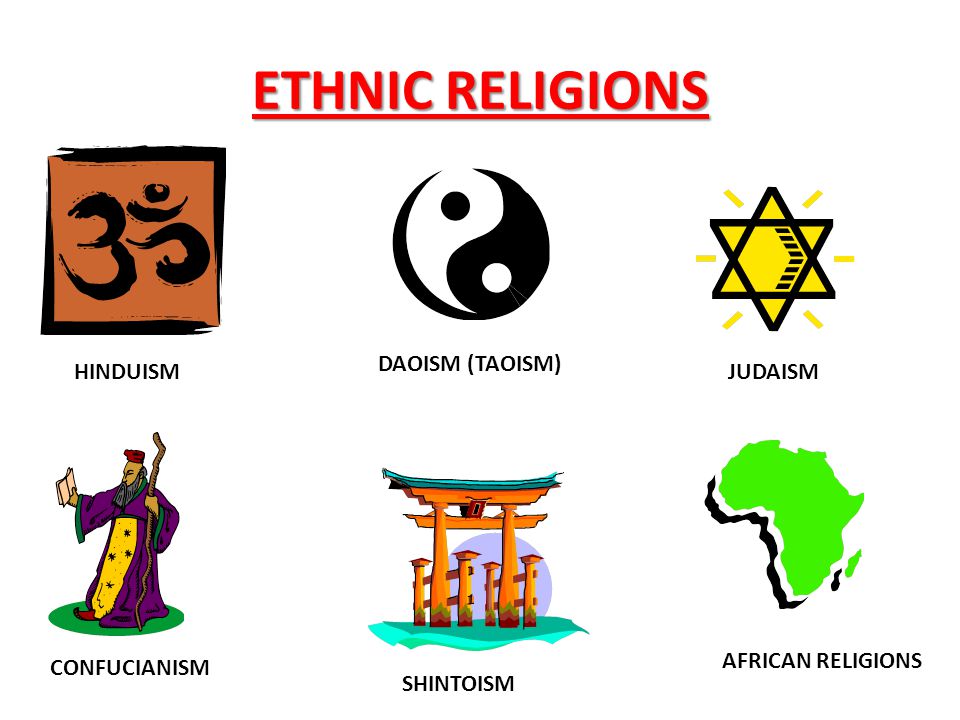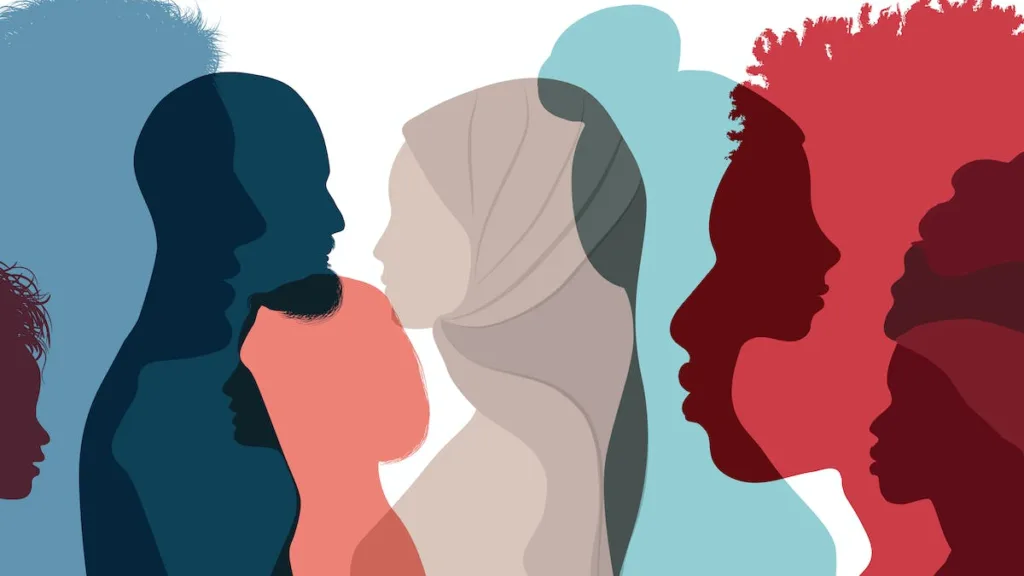Ethnic religion is a type of religion that is closely tied to a specific ethnic group, culture, language, and customs. Ethnic religions are usually practiced by people who share a common ancestry, history, and location. Unlike universalizing religions, ethnic religions do not seek to convert people from other cultures or regions.
Here are some examples of ethnic religions:
1. Hinduism: Hinduism is the oldest living religion in the world and the largest ethnic religion, with over 1 billion followers. It originated in the Indian subcontinent and is closely tied to the Indian culture, language, and customs. Hinduism has many gods and goddesses, and its followers believe in reincarnation and karma.
2. Judaism: Judaism is a monotheistic religion that originated in the Middle East and is closely tied to the Jewish people and their culture. It is one of the oldest Abrahamic religions and has over 14 million followers. Judaism believes in one God who created the world and revealed himself to Abraham, Moses, and other prophets.
3. Shintoism: Shintoism is the traditional religion of Japan and is closely tied to the Japanese culture, language, and customs. It is a polytheistic religion that worships the spirits of nature, ancestors, and gods. Shintoism has over 2 million followers in Japan and is often practiced alongside Buddhism.
4. Confucianism: Confucianism is a philosophy and ethical system that originated in China and is closely tied to the Chinese culture, language, and customs. It emphasizes moral values, social harmony, and respect for elders and ancestors. Confucianism has influenced many aspects of Chinese culture, including politics, education, and family life.
5. Taoism: Taoism is a philosophical and religious tradition that originated in China and is closely tied to the Chinese culture, language, and customs. It emphasizes living in harmony with nature, simplicity, and self-cultivation. Taoism has influenced many aspects of Chinese culture, including art, literature, and medicine.
Ethnic religions are an important part of human culture and history. They provde a sense of identity, community, and spirituality for people who share a common ancestry, history, and location. Although they may not seek to convert people from other cultures or regions, ethnic religions have a significant impact on the world’s religions and cultures.
The Three Ethnic Religions
The three ethnic religions are Judaism, Hinduism, and Japanese Shintoism. Ethnic religions are those that are closely associated with a particular ethnic group or geographic region, often having a historical or cultural connection to a particular place.
Judaism is an Abrahamic religion that originated in the Middle East and is closely tied to the Jewish people and their history. It is based on the belief in one God and the importance of following the laws and commandments given in the Torah. Judaism is often considered both a religion and a culture, with its own unique traditions and practices.
Hinduism is one of the world’s oldest religions and is closely associated with the Indian subcontinent. It is a diverse religion with a wide range of beliefs and practices, but is centered arund the belief in many deities and the concept of karma and reincarnation. Hinduism also has a strong cultural and social component, with many rituals and practices tied to daily life and family traditions.
Japanese Shintoism is the indigenous religion of Japan and is closely tied to the country’s history, culture, and landscape. It is a polytheistic religion that emphasizes the importance of nature and ancestor worship. Shintoism also includes many rituals and practices associated with daily life, such as purification rituals and offerings to the gods.
These three ethnic religions are unique in their beliefs, practices, and cultural and historical ties to specific regions and peoples.

Source: amazon.com
The Meaning of Ethnic Religion
Ethnic religion is a term used to describe religions that are closely associated with a particular ethnic group. These religions are oten seen as a defining part of the ethnicity’s culture, language, and customs. Ethnic religions are characterized by their close ties to specific cultures and are often practiced within a particular geographic region. Unlike universal religions, which aim to appeal to all people regardless of their ethnic background, ethnic religions are usually only practiced by members of a specific ethnic group. Examples of ethnic religions include Hinduism, Judaism, Shintoism, and many indigenous religions around the world. These religions typically have strong ties to the history and traditions of the ethnic group they are associated with, and are often passed down through generations via cultural practices, rituals, and stories. ethnic religion plays a significant role in shaping the identity and cultural practices of many ethnic groups around the world.
Major Ethnic Religions
The major ethnic religions are religions that are closely tied to a particular ethnic group or culture. Hinduism is the largest ethnic religion, with over one billion followers primarily located in India and Nepal. It is closely tied to the Indian culture and way of life. Another well-known ethnic religion is Judaism, which is tied to the Jewish people and their history. Judaism is primarily practiced in Israel and the United States, but also has significant communities in Europe and other parts of the world. Other examples of ethnic religions include Shintoism, which is tied to the Japanese culture, and Taoism, which is tied to the Chinese culture. These religions have become dispersed throughout the world due to migration, but they remain closely tied to their respective ethnic groups.
The Universalizing Nature of Christianity
Christianity is a universalizing religion. This means that it is open to anyone who wishes to join, regardless of their ethnicity, race, or cultural background. Christianity spread beyond its origins in the Middle East and becme a global religion, attracting followers from all corners of the world. Unlike ethnic religions, which are typically tied to a particular culture or location, Christianity has no single ethnic or national identity. Instead, it emphasizes the importance of faith and personal belief as the key to salvation, which is available to all who accept its teachings. Christianity has a long history of missionary work, with believers actively seeking to share their faith with others and convert people to Christianity. This emphasis on spreading the faith and welcoming new followers is a defining feature of universalizing religions like Christianity.
Ethnic Religions
Ethnic religions are those that are closely associated with a particular ethnic group or culture. They are often characterized by a strong connection between religion and cultural identity. Two prime examples of ethnic religions are Judaism and Hinduism.
Judaism is an Abrahamic religion that originated in the ancient Middle East. It is closely associated with the Jewish people and their culture. Judaism is based on the belief in one God who revealed himself to the prophet Moses, as well as a set of religious laws and traditions that have been passed down thrugh generations. The Jewish people have a strong cultural identity that is closely tied to their religion, and many Jewish holidays and rituals are deeply rooted in Jewish history and tradition.
Hinduism is a polytheistic religion that originated in the Indian subcontinent. It is closely associated with Indian culture and is the third largest religion in the world. Hinduism is based on the belief in multiple gods and goddesses, as well as a set of religious texts and traditions that have been passed down through generations. Hinduism is deeply embedded in Indian culture, and many Hindu festivals and practices are closely tied to Indian history and tradition.
Judaism and Hinduism are two prime examples of ethnic religions. Both religions are closely associated with their respective cultures and have a strong connection between religion and cultural identity.

Number of Ethno-Religious Groups
There are three ethno-religious groups that have been living together for more than a hundred years. These groups have distinct cultures, and the study aims to investigate how the individualist vs. collectivist culture influences the significance of the MOW dimensions among these three groups.
Exploring the Difference Between Ethnicity and Religion
Ethnicity and religion are two distinct concepts, although they are often interrelated. Ethnicity refers to a group of people who share a common heritage, culture, language, or other similar traits. It is a method of classification based on commonalities of a particular population. On the other hand, religion is a belief in or worship of a god or gods. It is a set of beliefs, practices, and rituals that are shared by a group of people.
While ethnicity is based on common cultural or historical factors, religion is based on shared beliefs and practices. Ethnicity can be inherited or acquired trough cultural assimilation, whereas religion is a matter of personal choice or faith. Ethnicity is more of a social construct, whereas religion is a spiritual construct.
Another significant difference between ethnicity and religion is that ethnicity is more permanent, while religion can change over time. People can change their religion, but they cannot change their ethnicity. Ethnicity is often associated with a particular geographical region, whereas religion can be found across the globe.
Furthermore, while ethnicity can sometimes be a source of conflict, religion often plays a more significant role in conflicts between groups. Religion has been a significant factor in many historical conflicts and wars, whereas ethnicity has been a reason for discrimination and prejudice.
Ethnicity and religion are distinct concepts that are often intertwined. Ethnicity is a method of classification based on shared cultural or historical factors, while religion is a set of beliefs and practices based on faith. While ethnicity is more permanent and associated with a particular region, religion can change over time and is often a source of conflict in society.

Four Ethnic Religions
Ethnic religions are religions that are closely associated with a particlar ethnic group or culture. Here are four examples of ethnic religions:
1. Hinduism: Hinduism is the dominant religion of India and is closely associated with the Indian culture. It has a complex set of beliefs and practices that include the worship of many gods and goddesses, the caste system, and the concept of karma and reincarnation.
2. Shintoism: Shintoism is the indigenous religion of Japan and is closely tied to Japanese culture and history. Shintoism emphasizes the worship of spirits or kami that are believed to inhabit natural features such as mountains, rivers, and trees.
3. Judaism: Judaism is the religion of the Jewish people and is closely linked to Jewish culture and history. It is based on the belief in one God who made a covenant with the Jewish people, as well as a set of laws and traditions that guide Jewish life.
4. Sikhism: Sikhism is a religion that originated in the Punjab region of India and is closely associated with Punjabi culture. It is based on the belief in one God, the teachings of ten gurus, and a set of ethical and moral principles that guide Sikh life.
The Universality of Hinduism
Hinduism is considered to be an ethnic religion rather than a universal one. The reason for this is that it is rooted in the culture and traditions of India, where it originated. While Hinduism has spread to other parts of the world and has followers from various ethnic backgrounds, it is still primarily concentrated in India and is deeply intertwined with the country’s history and society. Additionally, Hinduism’s beliefs and practices are often tied to specific deities and cultural customs that are unique to India, further emphasizing its ethnic roots.

Is Confucianism an Ethnic Religion?
Confucianism can be considered an ethnic religion in the sense that it originated in China and has been deeply ingrained in Chinese culture for centuries. Confucianism’s teachings and practices have influenced Chinese society’s social and ethical values, institutions, and traditions. Confucius himself was born in China and his teachings were aimed primarily at the Chinese people.
However, it is important to note that Confucianism is not a religion in the traditional sense of the word. It does not involve the worship of deities or the belief in a specific set of doctrines or rituals. Instead, Confucianism is more accurately described as a system of social and ethical philosophy that emphasizes the importance of moral conduct, personal responsibility, and respect for authority.
Furthermore, Confucianism has spread beyond the borders of China and has been embraced by people of various ethnicities and cultures, particularly in East Asia. Confucianism’s ethical and moral teachings have been found to be applicable to many different societies and have helped to shape the values and institutions of many different cultures.
While Confucianism can be considered an ethnic religion in the sense that it originated in China and has been deeply embedded in Chinese culture, it is beter understood as a system of social and ethical philosophy that has had a broad and lasting impact on many different cultures and societies.
The Most Followed Ethnic Religion
Ethnic religions are those that are closely tied to a paricular ethnic group or culture. Among the major world religions, Hinduism is considered to be the largest ethnic religion, with approximately 1 billion followers worldwide. Hinduism originated in India and is closely tied to the country’s culture, customs, and traditions.
Hinduism is a complex and diverse religion that has many different beliefs and practices. It is characterized by a belief in karma, reincarnation, and a variety of gods and goddesses. Hinduism also includes a wide variety of rituals, festivals, and holy texts.
While Hinduism is considered to be an ethnic religion, it has also spread beyond India to other parts of the world, including Southeast Asia, East Africa, and the Caribbean. In these places, Hinduism has often blended with local cultures and traditions, creating new forms of the religion that are unique to each region.
Hinduism is a vibrant and diverse religion that has had a significant impact on the culture and society of many countries around the world. With over 1 billion followers, it is the largest ethnic religion and continues to be an important part of the global religious landscape.
Conclusion
Ethnic religions are an important part of many cultures and communities around the world. They are closely tied to specific ethnic groups and are often seen as a defining part of their culture, language, and customs. Examples of ethnic religions include Judaism, Hinduism, and Japanese Shintoism, which have all played a significant role in shaping their respective communities. Although these religions have become dispersed across the globe through migration, their roots and traditions remain closely tied to their ethnic groups. Understanding ethnic religions is crucial in promoting cultural diversity and respect for different beliefs and practices.
